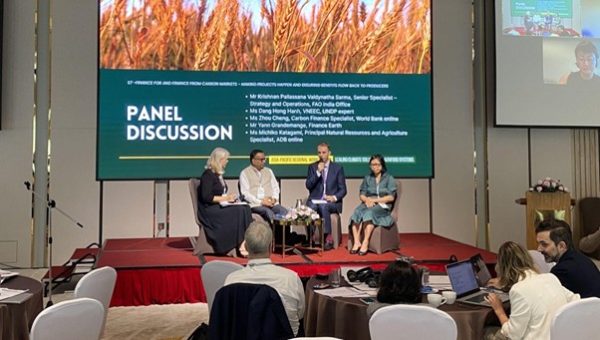On October 8, 2025, Energy and Environment Consultancy Joint Stock Company (VNEEC) participated and delivered a presentation at the Asia-Pacific Regional Workshop on “Scaling Climate Solutions in Agrifood Systems: Climate-Smart Technologies, Carbon Market Pathways, and COP 30 Preparation”.
The event was co-organized by the Ministry of Agriculture and Environment, the Food and Agriculture Organization of the United Nations (FAO), the Institute for Global Environmental Strategies (IGES), the United Nations Development Programme (UNDP) in Vietnam, the Ministry of Agriculture, Forestry and Fisheries of Japan, and other partners. The workshop gathered over 70 delegates from countries across the Asia-Pacific region.
During Session 7, Ms. Dang Hong Hanh, Co-founder and Executive Director of VNEEC, representing UNDP’s expert group, shared insights on investment options for Vietnam’s airlines through carbon credit generation in the agrifood sector.
In her presentation, Ms. Hanh provided an overview of CORSIA (Carbon Offsetting and Reduction Scheme for International Aviation), emphasizing that Vietnam has officially registered to join the voluntary phase starting in 2026. According to VNEEC’s estimates, Vietnamese airlines will need to offset approximately 10.7 – 15.4 million tonnes of CO₂ equivalent by 2035. This significant demand is expected to stimulate the domestic carbon credit market, particularly by encouraging the development of carbon projects in the agrifood sector.
Currently, the price of Eligible Emission Units (EEUs) under CORSIA is around USD 21.7 per credit, based on credits issued under the ART TREES standard from Guyana’s REDD+ program (the only project that has successfully issued EEUs to date). According to VNEEC’s projections, the price of EEUs between 2026 and 2035 could range from USD 23.2 to 36 per credit, reflecting a rising trend in the demand for high-quality credits meeting CORSIA’s rigorous requirements.

Photo: Presentation by Ms. Dang Hong Hanh, Co-founder and Executive Director of VNEEC
Ms. Hanh also shared examples of potential project models, such as shifting rice cultivation from continuous flooding to Alternate Wetting and Drying (AWD) practices and developing household biogas digesters for pig and cattle farms. These project types have strong potential to generate carbon credits that meet CORSIA requirements while also delivering co-benefits such as pollution reduction, energy savings, and improved livelihoods for farmers.
In addition, Ms. Hanh highlighted several challenges in issuing EEUs for agrifood projects in Vietnam that have already been registered under independent certification standards (such as Gold Standard – GS or Verified Carbon Standard – VCS). These include the lack of a clear legal framework, limited experience in transferring emission reduction results internationally, and varying levels of stakeholder engagement. Registering new potential activities is also expected to face significant difficulties due to the absence of suitable methodologies, as well as constraints in finance, investment, and institutional coordination. Overcoming these barriers will be essential for the agrifood sector to unlock their potential in generating high-quality emission reduction units.

Photo: Experts during the panel discussion
VNEEC’s participation in the workshop underscored Vietnam’s pioneering role in linking the aviation, agrifood, and climate finance sectors, contributing to the nation’s efforts toward achieving carbon neutrality by 2050, in alignment with CORSIA regulations and in preparation for the upcoming COP 30 Conference.
1,868 views, 4

Tags:
Bài viết liên quan